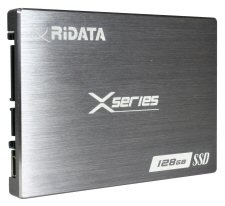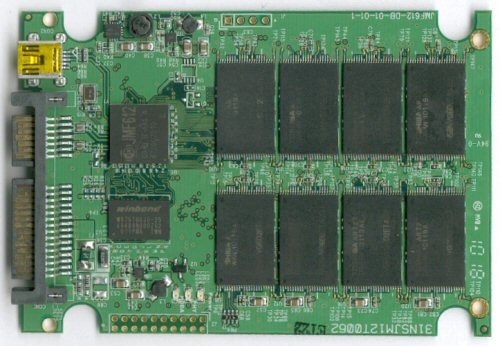

Model: RiDATA X Series 128GB Solid State Drive
Manufacturer: RiDATA
Provided By: Ritek USA
As the world’s largest manufacturer of optical storage media, Ritek doesn't need much of an introduction. The company got its start in 1988 and quickly established itself as a leader in the industry by producing the first CD in Taiwan. Ritek raised the bar once again a few years later by producing the country's first DVD and recordable DVD-R media. Today, Ritek manufactures everything from CD-R to Blu-ray Disc media for companies like Maxell, Memorex and TDK as well as its own subsidiary, RiDATA.
While best known for their recordable media, Ritek's RiDATA brand offers a wide range of flash-based storage products including memory cards, USB flash drives and solid-state drives (SSD). One of the latest additions to their product lineup is the X Series SSD. Based on JMicron's JFM612 controller chip, the X Series is available with 64GB or 128GB of multi-level cell (MLC) NAND flash memory as well as 64MB of on-board cache. The 128GB version of the drive is capable of delivering up to 255MB/s sequential read and 190MB/s sequential write speeds and includes features like a mini USB port, static wear-leveling and TRIM support.
| RiDATA X Series 128GB Solid State Drive | |||||||||||||||||||||||||||||||||||||
General Specifications
Performance
Reliability and Protection
Environmental
Dimensions and Weight
Other Features
|
Needless to say, this is only a taste of what the X Series has to offer. To give you an idea of what to expect, we'll take a closer look at RiDATA's new 128GB SSD and then put it through its paces to see how well it performs. Does the X Series have what it takes? Keep reading as we find out.

RiDATA's X Series SSD comes in a small, gold colored box. While there aren't a lot of details on the front, there is a large, plastic window which lets you look inside the box and see what the SSD looks like. The back of the box has a bit more information about the X Series, including a list of features. Inside the box you'll find the drive secured in a plastic tray. Surprisingly, there wasn't any documentation or even a warranty card.
Physical Features:
RiDATA's X Series SSD is pretty well constructed. The drive's outer casing is made out of aluminum. Along with it being strong and durable, it is very lightweight. On top of that, its brushed aluminum finish looks great.


The X Series uses JMicron's JMF612 controller chip. The JMF612 can be found in a number of other consumer SSD's including the Corsair Reactor, Patriot Zephyr, Active Media Predator X7, A-DATA S596 and WD SiliconEdge Blue. Looking at the pictures below, you can see that both sides of the PCB are covered in memory chips. For the X Series, RiDATA opted to use Toshiba's TH58NVD2ETA20 NAND flash chips. The SSD also has a single 64MB Winbond W9751G6JB-25 memory chip that is used for caching.


JMicron's JMF612 controller chip also offers native support for USB 2.0. As you can see, RiDATA has taken full advantage of this feature. The X Series sports a mini USB 2.0 port which allows it to be used as an external drive. This is especially useful if you're looking to clone your laptop's hard drive before installing the SSD.

The test system used in this review was an HP dc7900. The computer came equipped with an Intel Core 2 Duo E8400 3.0GHz CPU, 2GB of DDR2 800MHz memory, Seagate Barracuda 7200.10 ST3250310AS 250GB SATA hard drive, NVIDIA Quadro FX570 256MB PCIe graphics card and Intel 82567LM-3 gigabit network card. For the operating system, I installed a fresh copy of Windows 7 Enterprise.
To test the performance of the RiDATA X Series SSD, I ran a series of benchmarks using CrystalDiskMark 3.0, HD Tach RW 3.0.4.0, ATTO Disk Benchmark 2.43, HD Tune Pro 4.01 and Iometer.
CrystalDiskMark 3.0:
First, I ran a few quick tests using CrystalDiskMark. This benchmark tool measures the performance of a storage device by testing its sequential read and write speeds as well as its random read and write speeds using blocks 512K and 4K in size.

According to RiDATA, the 128MB version of the X Series is capable of 255MB/s sequential read and 190MB/s sequential write speeds. While the drive performed well, it came up a bit short of these numbers in our tests.
HD Tach RW 3.0.4.0:
Next, I used HD Tach to test the X Series' read, write and burst speeds as well as its seek times and CPU usage.

Looking at the screenshot above, you can see that the X Series had average read and write speeds of 219.4 MB/s and 167.7 MB/s respectively, as well as a burst speed of 248.2 MB/s.
ATTO Disk Benchmark 2.43:
I also used ATTO Disk Benchmark to test the X Series' sequential read and write speeds. The test was run using blocks ranging in size from 0.5KB to 8192KB and the total length set to 256MB.

When tested with ATTO, the X Series' read speeds topped out at about 258 MB/s and its write speeds at 149 MB/s.
HD Tune Pro 4.01:
Next, I ran a series of tests using HD Tune Pro. This hard disk utility measures a drive's performance by testing its sequential read and write speeds as well as its access time, burst rate and CPU usage. For this review, I'm also going to use it to benchmark the X Series' random read and write speeds, random access times and the number of operations per second.
RiDATA's X Series SSD performed fairly well when reading. The drive had an average transfer rate of 213.5 MB/s and an access time of 0.2 ms. When writing, the X Series started out at about 160 MB/s, but then quickly dropped off, ending with an average speed of only 82.6 MB/s.
RiDATA really doesn't say what the X Series is capable of in regards to IOPS. In our tests, the drive achieved 3087 IOPS and an average speed of 12.059 MB/s when reading 4K blocks. While not earth shattering, this is about average for a drive of this caliber. Unfortunately, the X Series did not perform nearly as well when writing. Looking at the screenshot above, you can see that the drive achieved only 557 IOPS and an average speed of 2.179 MB/s.
Iometer:
Lastly, I ran a series of tests using Iometer. This tool can be configured to benchmark a number of things. In this case, I used it to measure the X Series' read and write speeds and the number of operations per second. These tests were run using blocks ranging from 512B to 2MB in size.

The X Series' sequential read and write speeds were very similar to what we saw in our other tests. With a 2MB block, the drive reached average read and write speeds of 225.05 MB/s and 205.32 MB/s, respectively. The X Series wasn't as fast when doing random reads. However, the biggest performance hit came when doing random writes. With a 2MB block, the drive had an average speed of only 25.21 MB/s.

The performance here was very similar to what we saw with HD Tune. In our tests, the drive reached 3099 IOPS when doing a random read and 544 IOPS when doing a random write with 4K blocks. Digging a little deeper I found that the latency was also very high when doing random writes. With 4K blocks, the average response time averaged between 4-6 ms and in some cases peaked as high as 1700ms.
To see if this was a caching issue, I went back and reran the 4K random read and write tests by themselves. As you can see below, the performance was greatly improved. The IOPS and transfer rate speeds were not only higher, but the average response time was a tenth of what we saw when the benchmarks were run with with the others.
| Transfer Rate |
IOPS | Average Response Time |
Maximum Response Time |
|
| 4K Block - Read | 13.24 MB/s | 3391 | 0.59ms | 19.66ms |
| 4K Block - Write | 5.63 MB/s | 1442 | 1.38ms | 997.50ms |
While not the fastest consumer SSD on the market today, RiDATA's X Series performed relatively well throughout most of our tests. Thanks to its JMicron JMF612 controller and 64MB cache, it was able to read at speeds as high as 258 MB/s and write at speeds in excess of 165 MB/s. The X Series' static wear leveling and TRIM support also did a great job of keeping the drive at peak performance.
That being said, the X Series' random write performance was a bit concerning. When tested with Iometer, the drive's response times were very high, which had a negative impact on its IOPS and transfer rate. This may remind some people of JMicron's infamous JMF602 controller. However, the X Series didn't show any signs of stuttering during normal usage.
The 128GB X Series SSD is available now and can be purchased from Newegg.com for $325. If you don't need the extra capacity and want to save a few bucks, the 64GB version can be picked up for $190.
Highs:
- 128GB capacity
- Good sequential read and write speeds
- Well constructed aluminum casing
- 64MB on-board cache
- Low power consumption
- Supports S.M.A.R.T., TRIM and wear leveling
- Mini USB port
Lows:
- High response times when doing random writes
- Does not include any documentation or software
- Only a 2 year warranty




